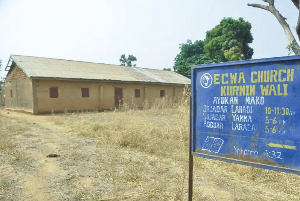Governments ought to review the way international agricultural commodity markets are governed, FAO Director-General José Graziano da Silva told ministers from around the world gathered for a meeting on the subject on Monday.
Commodity markets caught global attention due to volatile food prices in the past five years. While prices are currently declining, Graziano da Silva noted that underlying issues lurk in market institutions largely forged in the 1970s.
Enormous changes since then, in production and distribution fronts, "have had far-reaching implications not only for how international commodity markets work but also for food security, property rights and access to productive resources, and the position of smallholder commodity producers," he said in opening remarks at FAO's third ministerial meeting on international agricultural commodity market governance.
A statement issued by Christopher Emsden of the FAO Media Relations in Rome and copied to Ghana News Agency said the FAO has piloted the idea of creating inclusive "multi-stakeholder fora" involving…stakeholders in a particular commodity market: government, private sector producers and traders, consumers and non-governmental organisations.
It also hosts AMIS, the Agricultural Market Information System, an early-warning monitoring service that allows for coordinated response in times of stress, such as the 2012 droughts in North America and the Black Sea region.
"We need more," Graziano da Silva said.
Lassaad Lachaal, Minister for Agriculture of Tunisia and chairperson of the ministerial meeting, said there were "deficiencies" today in amassing reliable, up-to-date information on commodity stock levels and trends and that a stronger institutional scheme to promote policy coordination is needed.
"Governance-related issues are gaining increasing attention, especially in light of the post-2015 Development Agenda," he said.
Ministers in attendance included those from Burkina Faso, Central African Republic, Georgia, Haiti, Lebanon, Malawi, Mauritania, Portugal, South Africa, Sudan, Tonga, Ukraine, United Republic of Tanzania and Zambia. Other countries sent vice ministers or senior officials, including Italy, Japan, the United Kingdom and United States.
The Committee on Commodity Problems, a FAO technical committee with more than 100 members set up in 1946 to survey and review international aspects of commodity production, trade and distribution, will meet from Tuesday 7 October through Thursday 9 October.
The statement said one question ministers had been asked to discuss is how commodities should be related to the broader international development goals of the Post-2015 Development Agenda.
It said commodity production and export account for a fifth of the world's economic activity and were estimated to provide incomes and employment for more than a billion people.
It said smallholders in developing countries produce the lion's share of the world's agricultural commodities, including non-staple foods such as sugar and coffee.
It said improving their productivity and relative prosperity is central not only to FAO's goal of eradicating hunger, but to the broader United Nations agenda of supporting sustainability in all policy arenas.
It said: “Nearly two-thirds of developing countries rely on primary commodity exports for more than 50 per cent of their export earnings.
“Many countries have high levels of dependence on commodities such as bananas, jute or cotton. Coffee alone account s for two-thirds of Burundi's export earnings.”
It said globally, 80 per cent of coffee is produced by smallholders, and the figure is higher for cocoa, adding that “both products are part of global value chains that are often dominated by distributors”.
Business News of Wednesday, 8 October 2014
Source: GNA
Ministers meet to discuss commodity markets
Entertainment











